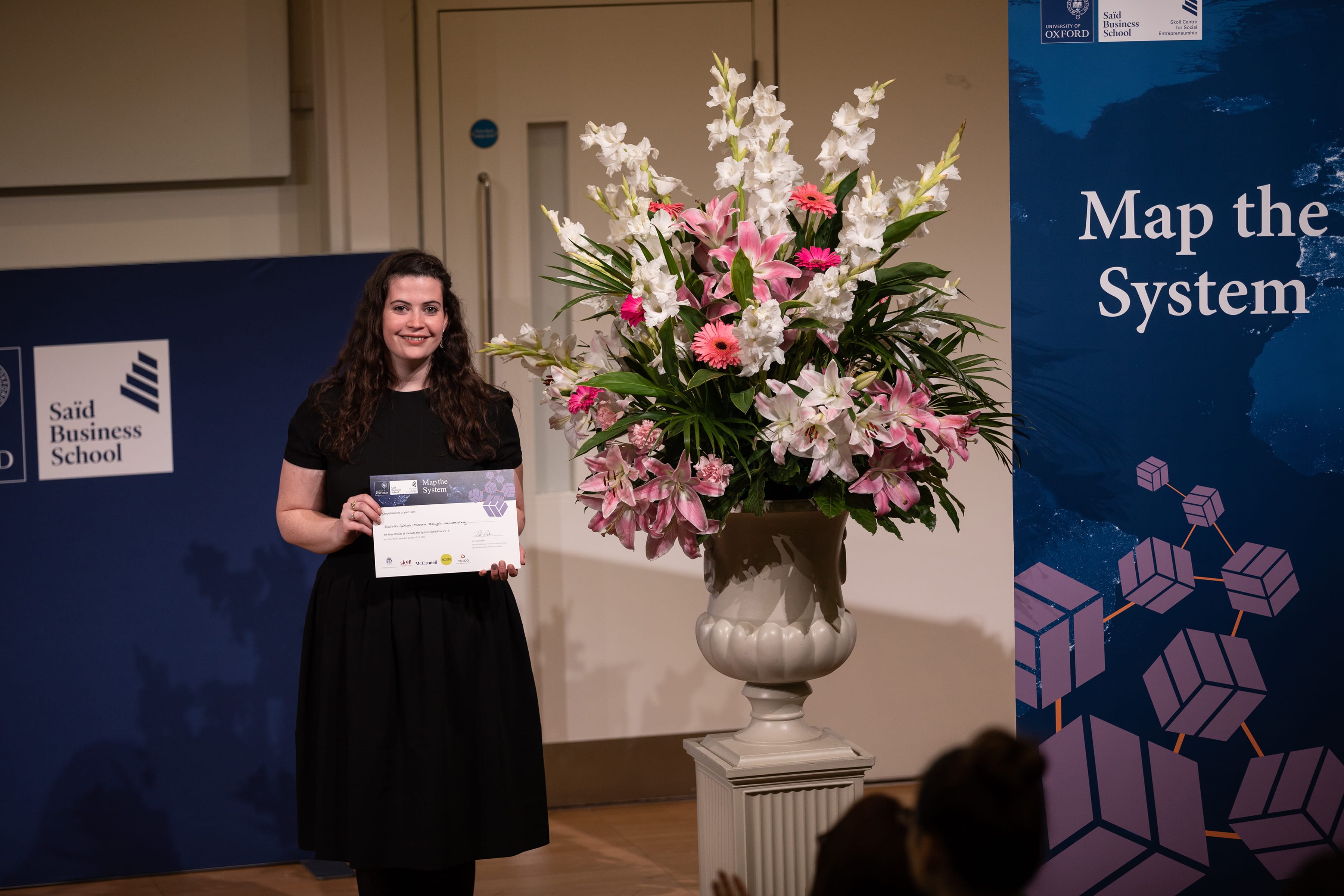The Skoll Centre is pleased to announce the winners of its 2018 Map the System competition.
Map the System is a global competition that asks participants to research the ecosystem of an issue they care about. As Daniela Papi-Thornton, (founder of Systems-led Leadership and former Deputy Director of the Skoll Centre) explained, “so often students are asked to find solutions or come up with a business plan on an issue they know little about”, she continued, “we created Map the System as an antithesis to the business plan competition, instead, we want you to understand the system of that issue”. By mapping the issue, change-leaders are better informed and better equipped to find the gaps and levers of change as well as challenging their own assumptions and biases.
27 international higher educational institutions took part in the competition this year, with a collective 470 applications from teams. Just 15 teams made it to the Global Final here in Oxford which was held at the Saïd Business School, from 1–3 June. Teams presented their research in a 10-minute pitch to judges, where just six were chosen to go through to the last round and presented to the panel of judges and a live audience.
The judges for the Global Final were:
- Jasmine Lau, a social entrepreneur and educator from Hong Kong, Jasmine is also the Founder and Executive Director of Philanthropy In Motion (PIM).
- Odin Mühlenbein, a Partner at Ashoka Germany and Lead of Advisory at Ashoka Globalizer.
- Daniela Papi-Thornton, former Deputy Director of the Skoll Centre, and thought-leader in systems change education.
- Annelies Tjebbes, a biomedical engineer and social innovator.
- Chintal Barot, Founder and Director of CoSustain Consulting Limited.
It was a tough choice for the judges, as all six teams gave a slick and professional performance showing their depth of research and clear understanding of their chosen issue in their supporting reports and maps.
First place was awarded to Mount Royal University, Canada, with their one-person team, Roisin Dillon, winning the top prize of £4,000. Roisin focused her research on the opioid epidemic in Canada with a particular focus on fentanyl. Many Canadians have needlessly passed away as a result of taking illicit substances whilst unaware they are laced with this lethal drug. Her research investigates the solutions aimed at educating and disseminating the available information.
Second place was awarded to University of Melbourne’s team Luna Baby winning a cash prize of £3,000. Dr Abbey Eeles and her team researched the issue of premature birth, specifically looking into supporting parent and infant well-being in Australia. Due to the powerful role that parents play in the development of their premature infants, the team focused their research on the support given to these parents in neonatal nurseries and how it can be improved.
Third place was awarded to Simon Fraser University, Canada, with team Bridging the Gap, winning a cash prize of £2,000. Bridging the Gap explored the mental health and wellness outcomes of second-generation Asian youth in the Greater Vancouver area. This group experienced unique mental health challenges due to the mental stressors imposed by processes of acculturation.
The three runner-up teams who also presented on Sunday, were:
Teach for All, Chile with team +Chinlas en STEM: Evidence has shown significant gender disparities in maths subjects at school where girls tend to get lower results, leading to fewer women participating in STEM careers. The +Chilenas en STEM team posit that part of this gap is produced by gender stereotypes, which can be unconsciously reproduced in the household and in the classroom. This team have therefore investigated a new initiative to work with teachers on gender-stereotype awareness.
University of Oxford, UK with team Daughters: Team Daughters has focused on gender inequality in the U.S. State of Utah. With a team that have deep Utah roots, they have witnessed first-hand the impact on gender disparity in their own families and in the community. Their research maps solutions to educate communities and reduce the impact of gender inequalities in this state.
Utah Valley University, U.S.A with team Lakeridge: Team Lakeridge has researched Utah’s Ogden-Salt Lake-Provo area (the Wasatch Front), and its unique geography that creates ‘inversion’ – a lid that traps cooler air in the valleys. This layer traps toxic air particles released by natural sources and human activity, which leads to health issues, stifled economic growth, and the general deterioration of quality of life in the region.
“This year’s finalists have done an excellent job of mapping their issue’s ecosystem” says Dr. Peter Drobac, Director of the Skoll Centre. He continues “yes, this is a competition, but more than that, it is an opportunity to take hold of a rare and valuable learning opportunity. It’s a representation of the Skoll Centre’s core belief about social change; each one of us has the responsibility to deeply understand the problems we want to be a part of solving.”
To learn more about the issues covered by the final six teams, you can find their presentation recordings, reports, and systems maps online at www.mapthesystem.sbs.ox.ac.uk.
If you are an educator interested in teaching systems-led leadership at your institution and want to be a part of the 2019 Map the System competition, contact the Skoll Centre team at skollcentre@sbs.ox.ac.uk.
